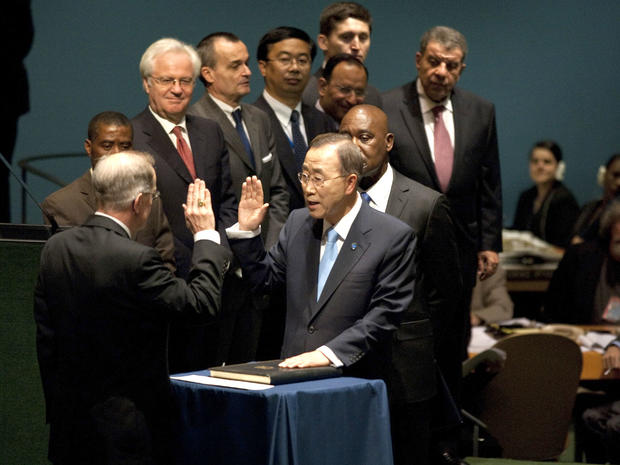Ban Ki-moon reelected as U.N. Secretary General
The General Assembly on Tuesday reelected the U.N. Secretary General, Ban Ki-moon, by consensus to a second five-year term. The Obama administration's U.N. ambassador, Susan Rice, said that no one understands the burdens of the role more than he.
The reelection of the Secretary General for a second term is no surprise at the U.N., since there were no other candidates, but for the U.S., Ban Ki-moon's reappointment is good news because he has had a closer relationship with Washington than all seven previously-elected leaders of the world body, and because he is an outspoken supporter of U.N. and NATO efforts to protect civilians in warzones.
Despite criticism that the South Korean Secretary General has not been as outspoken as his predecessors, the support of the Secretary General was unanimous for several reasons: His leadership on issues in the Middle East; His role in Haiti's recovery; His commitment to combating HIV/AIDS; His development of a new program on women's leadership; And, overall, his willingness to travel the world - to every continent - to speak directly with world leaders.
The five-year tenure of the Secretary General has been in the mold of one of the most beloved Secretary Generals, Dag Hammarskjold, whom Ban quoted in his acceptance speech, because of his intense travels and his ability to communicate directly with world leaders.
After the difficult term of his predecessor Kofi Annan - which was plagued by the oil-for-food crisis - the tenure of Ban Ki-moon has been one of quiet diplomacy that has elevated the U.N. in international crises, including Libya, Darfur, Afghanistan, and the Arab-Israeli crisis.
After saying, "Today, nothing is impossible," the Secretary General can expect several world crises to loom large: The uprisings in the Middle East; The nuclear ambitions of Iran and North Korea; The downturn in the international economy; And the increase in global drug trade and refugees. All of these will be on the table when the world leaders return to New York in September.
As the Obama administration relies on the U.N. Security Council to back its effort to downsize troops in Afghanistan, as well as its continued leadership, along with NATO, in Libya, the White House is looking forward to a continued close relationship with the reelected Secretary General.

